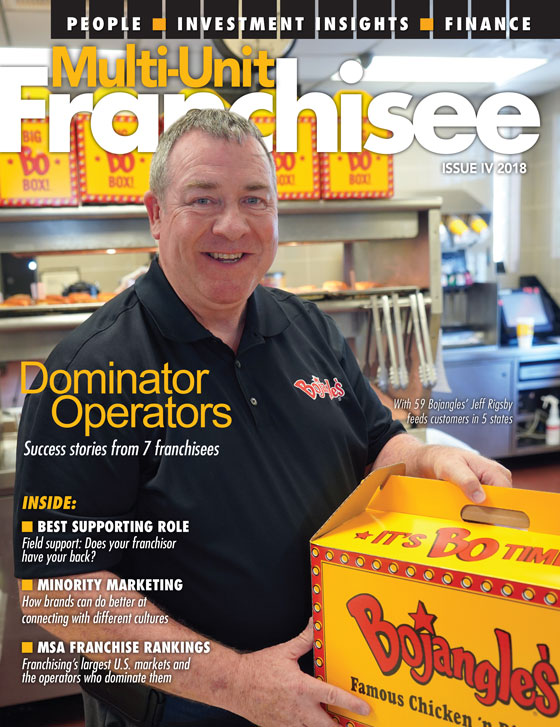Shifting Landscape: 5 Trends Changing MU Franchising

As we head toward 2019 how should we describe today's multi-unit (MU) and multi-brand (MB) operators? I suspect the answer to that question is about to change. Let's look at what's happening to this very important part of the franchise business model and see if we can understand what it means for the future.
MU expansion within brands
Over the past 30 years, we have seen the rise of MU operators where today they control the majority of franchised unit activity in the U.S. Until recently, MU growth mostly focused on new unit expansion, with an occasional acquisition of units from smaller operators in the same system (many with franchisor encouragement to take over troubled units). However, we're increasingly seeing economic scale factors drive active consolidation in some brands. We're also seeing where the conditions exist for consolidation in brands not yet showing much activity, where single and small MUOs are being acquired by other, usually larger, MU operators. Some of our research assignments for capital providers in the past year have been focused on identifying brands that are expected to see rising consolidation.
MB expansion within markets
In the past decade or so, MU operators became MB operators at an increasing rate. From our conversations with many MB operators, we're told that's happening for several reasons. Some say it's simply for business risk diversification. Others say it's because there's a lack of territory availability for their primary brand in their preferred geographies. When MU operators gain experience and knowledge in a specific geography or market, they will often choose to expand into a new brand within that same market, rather than expand into a new market with the same brand. After all, they reason that what they know best is their local market. And what they've learned is how to execute the franchise business model, not just a specific brand's business model. Regardless of the reasons, there is a large and growing number of MB businesses today.
MB expansion across industries
While most franchisors want to keep their MU operators in the fold, franchisors have actually accelerated the trend toward MB movement across industries. Many franchisors have franchise agreements that essentially prevent franchisees from signing agreements with other brands in the same sector. Therefore, MB operators are crossing sectors, for instance QSR to casual. However, these types of agreement restrictions have encouraged MB operators to also cross industries, such as food to fitness. In effect, today's MB operators are experienced franchise business model operators, so a new sector or industry is less relevant to their likelihood of success than their expertise as a franchisee.
From active to passive MU investors
Another, more recent, trend has been the rise in sizable franchisee investments by third parties, such as PE firms, family foundations, and hedge funds. We have seen a significant increase in such firms seeking our help to define specific characteristics that lead to identifying potential MU and MB businesses, either as minority, majority, or full buy-out transactions. If capital costs remain relatively low, this trend will become more common.
MU investors going upstream
The combination of economic scale and lots of capital available has led to a relatively new trend: investors are more frequently asking us to help evaluate brands earlier in their life cycles for possible investment opportunities. We have observed this through the types of brand analysis that PE firms, lenders, and, more recently, MB operators themselves, have asked us to do. With more than 300 new brands a year seeking to grow using the franchise business model, the question posed to us is how to pick the winners before it's obvious they are winners.
As we comb through decades of franchise data, we are beginning to find some predictors of emerging brand success that are helping our MB investor clients find new opportunities. The appeal is obvious: wide-open territories, fresh approaches to consumer trends, the ability to negotiate better franchise agreement terms--and, in yet another new trend, the emerging brand growth boost of investing in both franchised units and the franchisor at the same time.
This last point is an example of the growing separation of operator investor and passive investor. We've had passive investors in franchisee businesses for decades, but they have generally been relegated to family and friends. We're now being asked by larger investor classes, such as PE firms and wealth management firms, to assist in putting capital into larger MB operators as minority or majority investors.
Investor groups are showing up in many varied ways. We have recently been approached by several real estate firms to help them find brands that align with the specific demographics they seek around their sizable development projects. In yet another twist on the real estate market, we were asked by a business group that assembles multi-pad properties to help put the right mix of franchised businesses on them to create the lease stream that allows them to sell the underlying properties at specific cap rates to REITs.
At the center of all these trends sits the multi-unit operator. Clearly, MU operators have been taking on many varied forms we're just beginning to recognize. Instead of talking about MU operators as a group, I suspect soon we'll start differentiating them across all these versions of what we are starting to recognize as clear trends today.
Darrell Johnson is CEO of FRANdata, an independent research company supplying information and analysis for the franchising sector since 1989. He can be reached at 703-740-4700 or [email protected].
Share this Feature
Recommended Reading:
FRANCHISE TOPICS
- Multi-Unit Franchising
- Get Started in Franchising
- Franchise Growth
- Franchise Operations
- Open New Units
- Franchise Leadership
- Franchise Marketing
- Technology
- Franchise Law
- Franchise Awards
- Franchise Rankings
- Franchise Trends
- Franchise Development
- Featured Franchise Stories
FEATURED IN

Multi-Unit Franchisee Magazine: Issue 4, 2018

$100,000
$80,000





 The multi-unit franchise opportunities listed above are not related to or endorsed by Multi-Unit Franchisee or Franchise Update Media Group. We are not engaged in, supporting, or endorsing any specific franchise, business opportunity, company or individual. No statement in this site is to be construed as a recommendation. We encourage prospective franchise buyers to perform extensive due diligence when considering a franchise opportunity.
The multi-unit franchise opportunities listed above are not related to or endorsed by Multi-Unit Franchisee or Franchise Update Media Group. We are not engaged in, supporting, or endorsing any specific franchise, business opportunity, company or individual. No statement in this site is to be construed as a recommendation. We encourage prospective franchise buyers to perform extensive due diligence when considering a franchise opportunity.